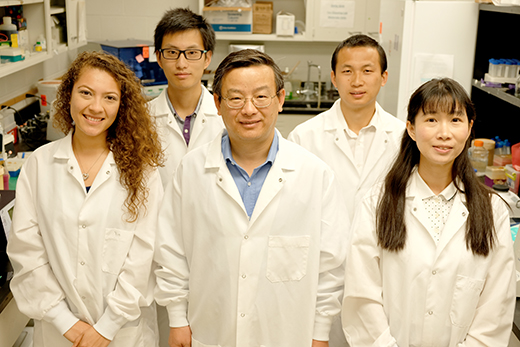Veterinary researcher receives NIH grant for vaccine development against E. coli
Wednesday, July 13, 2016

Weiping Zhang credits his team for the success in acquiring grants to support his research on E. coli-related vaccines. From left are Carolina Garcia, master's student in biomedical science; Jiachen Huan, master's student in biomedical science; Weiping Zhang, professor of microbiology; Qiangde Duan, postdoctoral fellow in diagnostic medicine and pathobiology; and Ti Lu, doctoral student in pathobiology. Not pictured are former postdoctoral fellows Rahul Nandre, Xiaosai Ruan and Mei Liu. | Download this photo.
MANHATTAN — A researcher with Kansas State University's College of Veterinary Medicine will use a five-year, $2.1 million grant from the National Institutes of Health to work on a vaccine for E. coli-associated diarrhea for both humans and animals.
The grant to Weiping Zhang, professor of microbiology, is his third in three years to develop vaccines for E. coli diarrhea.
Zhang said diarrhea is a leading cause of death in children under 5 years of age, and that enterotoxigenic E. coli, or ETEC, is one of the most common bacterial causes of diarrhea in children.
"Currently, there are no available vaccines against this type of diarrhea," Zhang said. "Whole-cell vaccine candidates have been under development but require further improvements because they provide inadequate protection and produce unwanted adverse effects."
Effective vaccines for enterotoxigenic E. coli have proved to be very challenging, said Frank Blecha, university distinguished professor and associate dean for research in the College of Veterinary of Medicine.
"Dr. Zhang's vaccine development strategy for ETEC using multi-epitope fusion antigens holds great promise for a vaccine that will limit diarrheal deaths in humans and animals," Blecha said.
Zhang, a molecular evolutionary biologist, began his E. coli pathogenesis and vaccine research and development career in 2003 when he studied molecular pathogenesis of individual enterotoxins produced by enterotoxigenic E. coli in diarrheal disease.
Most recently, Zhang's work has focused on multi-epitope fusion antigens, known as MEFA, for the development of broadly protective ETEC vaccines.
"Different ETEC strains produce immunologically heterogeneous bacterial adhesins that attach to host cells and colonize in small intestines, initiating ETEC diarrheal disease," Zhang said. "With the inclusion of an adhesin multi-epitope fusion antigen, in addition to a toxoid fusion antigen, a subunit vaccine is potentially able to induce antibodies against both toxins and up to 15 prevalent ETEC adhesins, effectively protecting against ETEC diarrhea. This grant will allow us to continue our research and study the effectiveness of this approach."
"The work being conducted by Dr. Zhang has significance for both human and animal health," said M.M. Chengappa, university distinguished professor and head of diagnostic medicine and pathobiology department. "This grant also recognizes the quality of Dr. Zhang's work, which we truly value in our department and college."
Zhang said his multi-epitope fusion antigens technology has attracted attention from funding agencies such as the Bill and Melinda Gates Foundation, and was featured in a recent VASE, or Vaccines against Shigella and ETEC, meeting in Washington, D.C. Zhang's laboratory also is working on ETEC vaccine projects funded by PATH Vaccine Solution/Bill and Melinda Gates Foundation.
